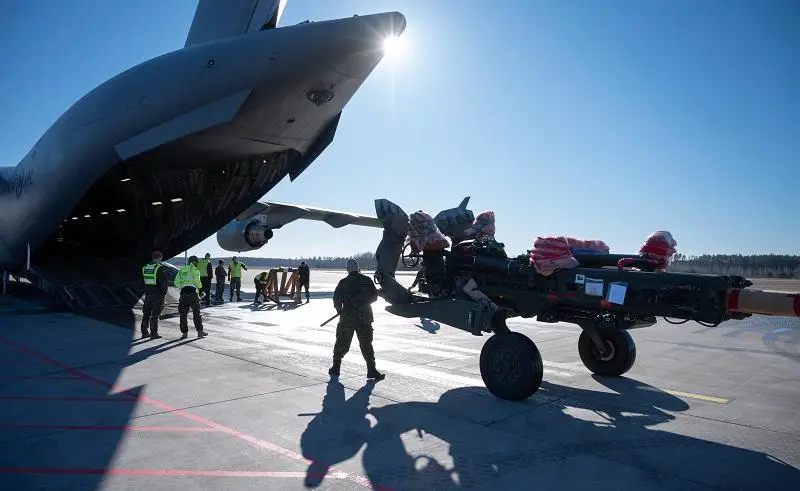On March 21 additional soldiers and equipment of the Canadian military arrived at the port Riga Airport to join those already in place as part of NATO eFP Battle Group Latvia. Royal Canadian Air Force departed 8 Wing Trenton carrying Canadian Army members, TAPV armoured vehicles, and related equipment and M777 artillery guns to Latvia as part of operation Reassurance. The small Baltic state of Latvia, which shares a border with both Russia and Belarus, has played host to a battle group of 1,500 NATO troops, led by 540 Canadians, since 2017. This is Canada’s largest military deployment.
The artillery battery is usually garrisoned at Shilo, Manitoba and is a Canadian Army combat arms sub-unit, which is made up of approximately 100 personnel with their large-caliber guns and ammunitions. When not required for training, the equipment will be stored in the Canadian compound at Camp Adaži, and the artillery personnel will return to Canada. Oftentimes, the battery is supported by forward observation parties, headquarters coordination and logistical cells. Its role is to coordinate and deliver indirect fire, typically in support of a infantry or armour units. The M777 lightweight 155-mm towed howitzer is lighter and smaller, yet more powerful than any gun of its kind, according to information from the Canadian Armed Forces.

The M777 howitzer is a towed 155 mm artillery piece and manufactured by BAE Systems’ Global Combat Systems division. The howitzer weighs 9200 pounds compared to the M109 Howitzer at 49,940 pounds, making it highly mobile. It can be equipped with a digital fire control system and loaded with munitions that use location data from Global Positioning System (GPS) satellites and an inertial navigation unit to steer to the target. The M777 can also be combined with Excalibur GPS-guided munitions, which allow accurate fire to 30 km. It has a sustained rate of fire of 2 rounds per minute and a maximum rate of fire of 4 rounds per minute. The Canadian government ordered 69 M777 equipped with the Digital Gun Management System (DGMS).
The Canadian Armed Forces (CAF) has members serving on Operation REASSURANCE in Central and Eastern Europe. They are there as part of NATO assurance and deterrence measures. These measures aim to reinforce NATO’s collective defence. It also shows the strength of Allied solidarity. During this operation, the CAF is conducting training, exercises, and some NATO-specific tasks. The CAF support to NATO helps make Central and Eastern Europe more secure and stable. The Canadian Armed Forces key contributions include: a Task Force and a Battle Group headquarters, an infantry company in Light Armoured Vehicles, a combat support company (intelligence and communications), and a support company (transportation, supply and medical).













